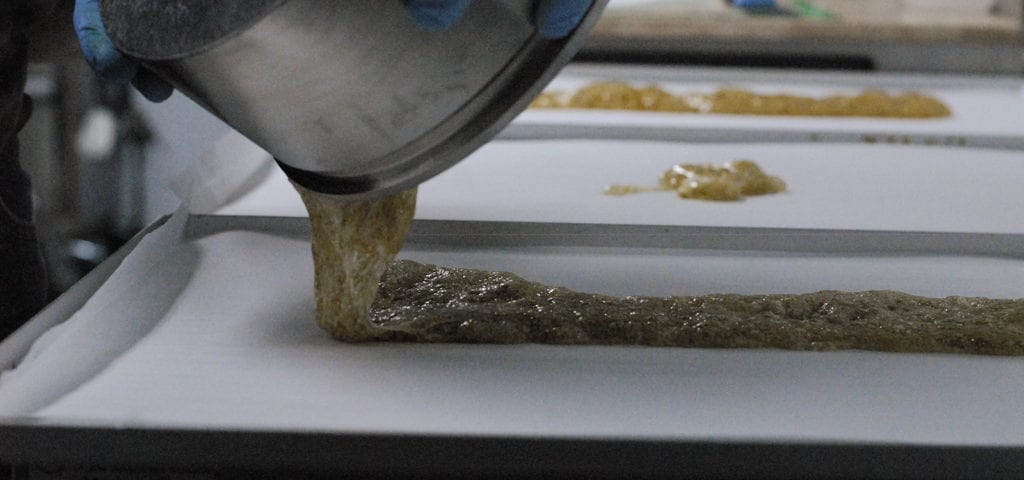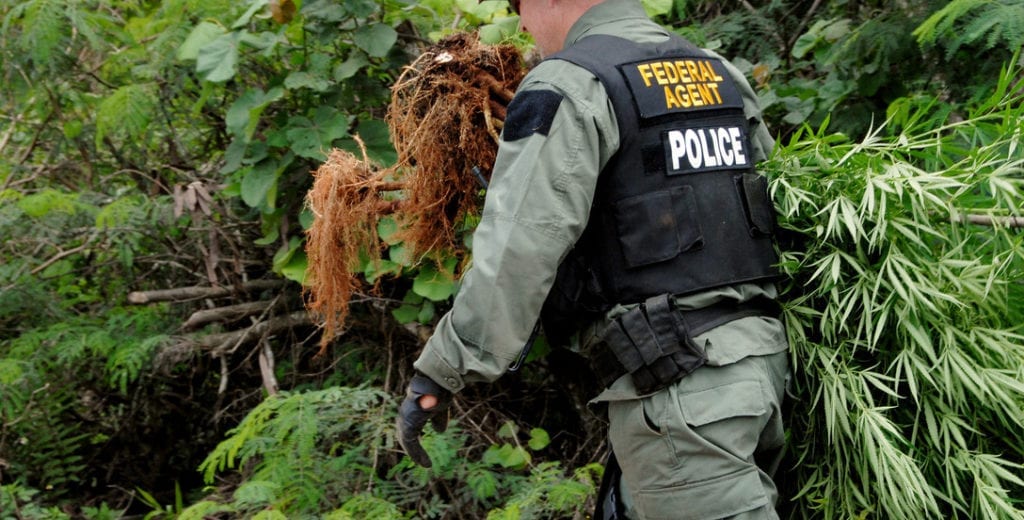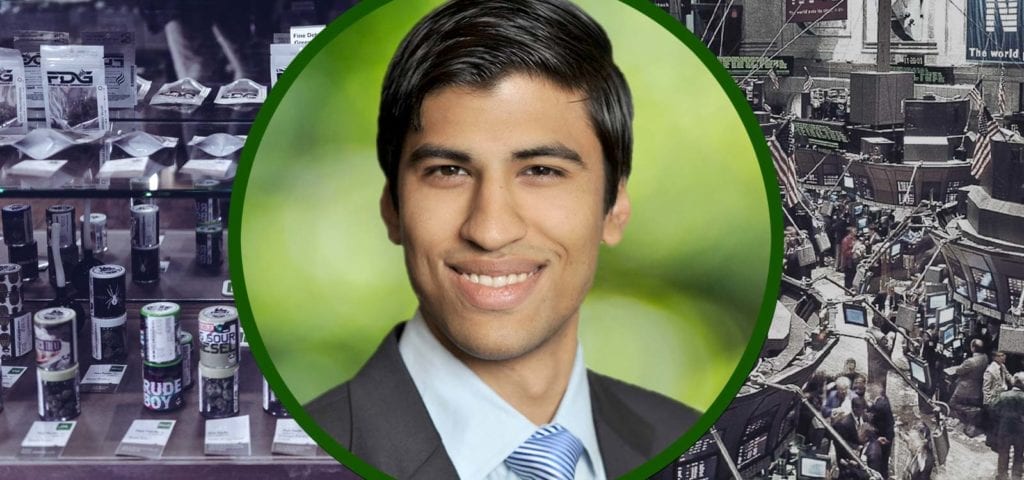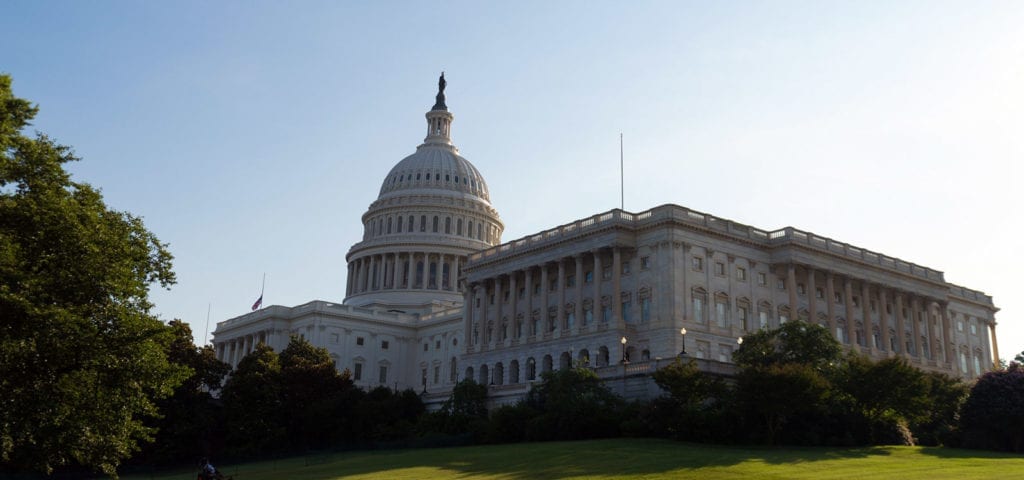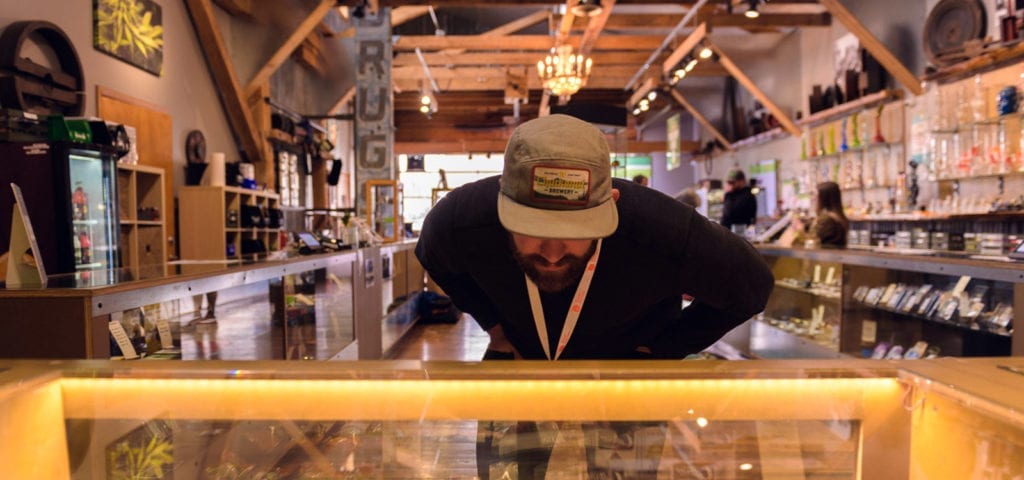Afzal Hasan is the President and General Counsel for CannaRoyalty, a Canada-based investment firm with cannabis acquisitions in Canada, California, Washington, Oregon, Florida, and Puerto Rico.
In this episode of the Ganjapreneur.com Podcast, Afzal joins host TG Branfalt to discuss his transition into the cannabis space as a high-level corporate attorney; the strategies being used to grow CannaRoyalty’s business acquisitions; the state of the cannabis markets in Canada, California, and beyond; his recommendations for identifying a winning cannabis investment; and more!
Tune in to the interview via the media player below, or you can scroll further down to read a full transcript of this week’s Ganjapreneur.com Podcast episode.
Listen to the podcast:
Read the transcript:
TG Branfalt: Hey there, I’m your host TG Branfalt and you’re listening to the Ganjapreneur.com podcast where we try to bring you actionable information and normalize cannabis through the stories of ganjapreneurs, activists and industry stakeholders.
Today I’m joined by Afzal Hasan, he’s the Executive Vice President of Corporate Development for CannaRoyalty, which operates and invests in canna businesses in Canada and the US. You guys have been making a lot of moves lately, especially in California, and I do want to get into that. Before we do that, how you doin this afternoon Afzal and tell me about how you got into the cannabis space?
Afzal Hasan: Excellent, well thank you sir for having me on here. It’s definitely a great opportunity for us and I’m very excited to share more about this story with you. It’s been a very busy past 24 hours for us. Go ahead and take a look at some of the stuff that’s been going on our newsfeed and I’m sure we’ll be talking a little bit more about that today. But to your question, cannabis industry, I started probably officially in a professional sense about three years ago.
I worked on as a lawyer over at my old firm, Castles Brock, the listing of a company called Bedrocan when then went on to be one the core pieces that formed Canopy Growth. Since that time I worked on a handful of other listing type transactions as a securities lawyer for various companies and CannaRoyalty was the last one that I worked on. I loved the platform so much that I really wanted to jump on board and thankfully the stars aligned and they took me on. It was really a pretty special occasion and has represented a great opportunity. This industry and space is quite special in a lot of different ways and so I’ve been pretty excited to be on board for the past year and change.
TG Branfalt: So you have some other broad experience in high-level positions including the Ontario Securities Commission which for our American listeners is the regulatory body for stocks in Canada, one of them. Why’d you decide to move away from the more traditional industries and into this space?
Afzal Hasan: It’s a simple answer and it’s a huge answer that I think drives it for a lot of different people. I mean we’re sitting at an historic juncture in history. It’s a time where you have a market that is pretty active and thriving in the black markets that is transitioning into the legal and I don’t know that there really is any parallel for this in human history. You take a look, the most often used comparison is the legalization after prohibition, but what I often point out to people is that prohibition was only a blip in time for the vast majority of time in human history, alcohol has been a legally consumed substance in a lot of different jurisdictions. That is quite different from a substance that has traditionally been on the verge or on the fringe of legality for most countries and especially in modern history has been very much so on the black market side of things.
That opportunity as both a lawyer and an entrepreneur was huge. To participate in something that is actually, an event like this, and to participate in shaping the course and direction of wherever this industry is going is a massive opportunity and what I can tell you is that because of our position and what we do, we’ve been involved in actually helping shape that direction as well. With both regulators and our relationships with them, and our commitment to trying to be in front of the curve of regulation where that’s going, also in the business sense as well. It’s a huge part of where we see ourselves, on the cutting edge of the cannabis industry.
TG Branfalt: So tell me about, and tell our listeners about the evolution of CannaRoyalty. Before we sort of plugged in, hit the record button on the podcast, you had said that the company moving sort of away from this investment style to an acquisition style. Can you just sort of walk me through your experience with CannaRoyalty and how it has evolved and why it’s taken that route?
Afzal Hasan: Absolutely. I don’t know that the core vision for the company has really shifted or evolved much, but the way that we’re going about attacking it has certainly changed quite dramatically over time. If you’d gone back three, maybe two years ago when the company was still at some of its early stages, what it looked like a little bit more than what it is right now is a diversified investment vehicle. The company was making investments into a variety of different things and generally they were passive or non-controlling. We were really trying to play the growth of the cannabis industry.
What we started to realize after doing that for a little while is just that the opportunity that was in front of us and in front of the whole cannabis industry was so huge that playing it through passive investments would probably not do it justice. Moreover and on top of that, the cannabis industry is at a really early, early stage right now. You certainly will have winners in this industry in the long run, but what I can conclusively say as an investor in this space for now a year and change myself personally, and three years for CannaRoyalty, is that we have limited senses of who is going to be on top of that industry and dominating that industry in the future.
Oftentimes, and what has really been a focus for the industry in the past few years has been cultivation. The view that we’ve espoused from the very outset is that cultivation for the most part is really gonna turn into an agricultural function and if you take a look at companies right now, especially if you take a look at Canadian companies that are listed and priced, their market capitalization and values assume that they’re gonna go much further past cultivation and really be stalwarts and dominant forces in this industry.
What we’ve realized through our investment activities is that trying to call the shots on whose gonna be the next Coke or Pepsi or Diageo of the cannabis industry right now is a very, very difficult proposition. You’re really shooting in the dark if you take the typical private equity rule that you’re gonna get one in 10. I would posit that it’s a much higher number to figure out how many runs you get in as a passive investor in the cannabis industry just because the whole industry is transitioning out from the black to the legal in a variety of different places on an ongoing basis and moreover, regulations and how its actually accepted into culture, that’s all shifting and evolving too.
So to be able to call it in advance is a really difficult exercise and we realized that what would be more powerful for us and what would ensure that we’re actually going to be there and around for that time in five or 10 years when this industry is really roaring ahead as we expect, is to build the platform that ensures that we’re a part of that industry. Rather than assuming that we are going to be the Coke or Pepsi or Diageo of the future, which is, I mean those are models I’ve used to emulate for our own business, we’re building a platform that will allow us to keep trying at it so that eventually we do end up with what is hopefully the Coke or Pepsi or the equivalents in Diageo’s portfolio of brands that they hold in the alcohol industry in the future.
That is inevitably going to involve some brands that we try or others try that either don’t do well or just have a limited market niche if you will. In that process of trying out a number of different things and having a platform that allows us to try a number of different things, our hope and expectation is that we’re really providing for the certainty of both ourselves and our shareholders, investors that we will be holding some of those brands at the end of this race.
TG Branfalt: If we look towards, we can talk, we can look to what your most recent acquisition in California of River Distribution and paired with your previous acquisition of Alta, you guys are obviously in California already targeting distributors. What do you look for broadly when targeting acquisitions and what’s most likely to make a business stand out to you?
Afzal Hasan: That’s a great question. All I would say as a general proposition is that there is no general proposition for investment strategy. What you’re seeing with the River and the other two acquisitions which we closed yesterday, which are Alta Supply which is another distributor and then Kaya Management, which is a manufacturer, is a strategically driven acquisition platform. What we have done is tried to secure the distribution pipeline in the state of California for a variety of reasons.
You could take a look at our press release that we issued yesterday on River Distribution. You’ll note that one of the major things for us is that distributors in California act as major gatekeepers in the market. They are responsible for testing and ensuring the products that get to consumers are clean and safe for them. They’re also responsible for collecting a lot of state taxes as well and remitting those to the state. They serve as a central point between manufacturers and retailers. Under California law, you are required as a manufacturer to sell your products through a distributor to a retailer and vice versa, as a retailer you’re required to purchase your products through a distributor even though a manufacturer might have put it together, with some limited exemptions for vertically integrated companies.
Because of that distribution was a huge part for us in building the platform that we are assembling. The platform is really designed to allow us to really jump into the cannabis consumer products market and have the flexibility to go at it with a number of different brands and products, with the expectation again that some of them won’t be the winners. I don’t know that I have any embarrassment or shying away to say that there’s gonna be plenty of products that people produce right now and it might include some of ours, that will not be the home runs in the long term, but what I do know is that those are all gonna be valuable experiences for us and they are gonna contribute to us finding those brands that are gonna have the long term value in the future.
For us it’s important that we have the infrastructure and platform that’s needed to be able to try a few times because, to go to my early point, we’re not trying to hitch our cart to just a single brand horse, which is a strategy that a number of companies have followed and more power to them for going down that path, but it’s not one that we see as being viable given our history and our background in this space as well. That’s the higher level plan, is really assembling that platform. Distribution is a key part because what that does is it ensures that we have access to retail shelves. In theory we could be looking to acquire retailers in the future, but one of the key factors and considerations for us is that you buy a retail location, but you’re limited in terms of what you can do with that. Ultimately, you can only drive a certain number of sales out of a particular spot because it’s geographically limited and the state of California is huge.
Rather than try and buy up retail outlets to give us access to consumers, we’ve decided to follow the strategy of actually going at it with distribution and with our acquisition of Alta Supply, combined with our proposed acquisition of River, we expect to be serving a majority of the retail, well we already are between the two of those companies serving a majority of the licensed retailers in the state of California and we’re really going to be looking to reinforce that position for future.
In terms of what’s next, I mean, I can provide the general strokes, which is really just that we are going to continue to develop the platform that supports our brand portfolio in California. There is a variety of different functions and horizontal areas in the cannabis industry that we are looking to target, but suffice to say, all of it is really gonna be focused on supporting that platform and creating an entity that can support the growth of a number of different brands.
TG Branfalt: I want to dig a little deeper into, from an investor’s standpoint, what CannaRoyalty offers and definitely want to talk to you about the Canadian legalization as something that a lot of Americans, we’re not either too familiar with or we don’t, we just don’t understand it. But before we do that, we gotta take a break, this is the Ganjapreneur podcast, I’m TG Branfalt.
If you are looking for a job in the rapidly growing and highly competitive industry Ganjaprenuer.com is the place to look. Visit the Ganjapreneur job board today to browse current openings with cannabis companies throughout the United States from entry level budtender positions to executive level career opportunities. You can also create a profile and upload your resume to be discovered by cannabis recruiters. Visit our job board at jobs.ganjapreneur.com to create your profile today.
If you are a business owner, you can post your job openings for as little as $25 on our job board to reach the largest and most engaged audience of cannabis professionals on the web. Companies who are listed in the Ganjapreneur business directory are eligible for free job listings. If you are already signed up, contact us today via the website or send us an email at grow@ganjaprenuer.com to activate your unique coupon.
TG Branfalt: Hey, welcome back to the Ganjapreneur.com podcast. I’m your host TG Branfalt here with Afzal Hasan. He’s the Executive Vice President of Corporate Development for CannaRoyalty, operates, invests cannabis businesses in Canada and the US. Man, give me the elevator pitch. Why should an investor buy CannaRoyalty stock over all of the other options that they have on the market, especially in Canada?
Afzal Hasan: I’d say it’s a good question and one that we obviously think about quite often as well. There’s different ways to take a look at it. If I was purely a numbers person and I was trying to crank that side of things, I would point you to what California is from a numerical sense versus any other jurisdiction in the world. I think without any other doubt in my mind, it really is the largest legal or regulated jurisdiction in the world for the production of cannabis. Canada has a lot of interest that has been turning, especially in the capital markets over here, but when you take into account that the market over here is not generating that much money in comparison to a lot of mature US jurisdictions, and that the total population of Canada is less than California and is also gonna be fragmented among a number of different regulatory systems with different provincial regulators and everything else, you start to realize that the financial picture is quite compelling in that California, again, offers you probably the biggest jurisdiction to operate in and therefore the biggest pie to chew on.
What I can point out to investors is if it wasn’t already clear with some of the moves that we’ve been making, California is a market that we see as being very important and one that we’re very squarely focused on. From a numbers perspective, I point out that we’re California focused and that should be a huge driver for somebody that’s looking at the numbers and market size and everything else.
Some of the other things that make California interesting and really tied to where our strategy is, just what California represents in the global culture of consumption. You could debate this to some extent, but I think it would be relatively well accepted that California actually is one of the few places in the world that shapes world culture and consumption. The media, the advertising, the etymology, cultural memes and trends, the things that get formed in California have and will continue to be exported into the human psyche across the world. That to us is a very strategic and special advantage as a company that is ultimately focused on creating a house of brands in the long term.
I mean, just to be crass about it, if we were going at this strategy in Canada, I would be quite doubtful as an investor that I’d ever be able to export that brand equity in a meaningful way across the world. The examples of Canada exporting brands across the world are extremely limited and to assume that that is gonna happen in any meaningful way is a bet that I wouldn’t want to be making as an investor.
Conversely, if you take a look at California, it is probably one of the most, if not the most discerning marketplaces in the world given it’s rich cultural heritage and the position that it plays in media and everything else. Over and above that in the cannabis industry, it’s also got a very rich background in history. What that means is you have some of the most discerning consumers in the world too. Rather than going to a state which has four licenses or nine licenses granted and assuming that we’re gonna be monopolistically cornering some part of the market because of a regulatory constraint, then hoping that that is what’s gonna drive our business, we’ve chosen California, not because it’s easy, but because it’s hard.
I hate to use a quote, but we are hoping, and our plan is to be able to generate a brands portfolio in the state of California that stands up in California because we’re quite confident that if we can do that in California, exporting it and transforming it across the world will be a pretty easy second step in comparison to having done that in any other jurisdiction across the world. There is another upside over there in terms of our California focus which then leads me to one of the other major reasons why the consumers should be taking a look at us, as consumer, investor, whatever it might be, as something that is really interesting.
At CannaRoyalty we really aren’t focused on any particular facet of the cannabis industry in terms of being a cultivator for example or purely a distributor, or purely a retailer, or whatever other horizontals you might have in the industry. What we’re looking at is ultimately that interaction between brand and consumer that keeps the consumer coming back again and again and again. That is in both a very simple concept, but also a very difficult thing to change and alter and create in consumers’ minds. Right now what I point out is that cannabis specifically had a cultural association and a stigma with illegal activity, non-productivity and all sorts of other negative stereotypes.
I think we’re slowly starting to see that open up, but the challenge that remains ahead of us and the many other companies that are looking to attack this industry is actually looking to secure a position in the cultural fabric of society that creates rituals and consumption patterns that are normalized and accessible to anybody. That is where our cannabis products fit in. Ultimately, in order for us to create a consumer product that consumers want, we really need to stretch beyond just putting a product on the shelf and really look to provide information and knowledge and cultural intervention in a sense for consumers to understand where that product fits into their lives and why they would want to be using it.
That is a mission that I don’t that you see with many, if any other companies and if you take a look at Canadian licensed producers, they all operate in what is purportedly a medical system. So facially what they continue to tell everybody is that they are medical companies. That isn’t quite the same mission that we have. I fully support and I think there is an immense plethora of uses for cannabis in the medical realm, but we are unabashedly not a medical company in the sense of actually trying to create medicine to prescribe to consumers. We are providing cannabis products and that fits into an adult use or health and wellness or whatever you want to call it. Those products can be used for consumers for whatever purpose they are allowed to use it for and as they choose to consume it. We are certainly not a pharmaceutical company and we don’t have that identity conflict that you might see with a number of other companies that have come out of a purely medical stance.
Those three things that I kind of walked through, those would be probably the major things that I’d point somebody to, to understand CannaRoyalty better and why it is different from pretty much anybody else that’s out there.
TG Branfalt: I will say this, it’s all really good point, focusing on California, you mentioned the population difference between California and Canada, but for me it’s really interesting that a Canadian company is focusing so much on a US market being that everybody right now is looking towards Canada’s federal legalization with sort of open eyes just wondering how this is gonna work because there’s Uruguay who has a very limited recreational, adult use regime and Canada, I mean, it’s the first country in the West to do this. I’m a little surprised.
Afzal Hasan: It’s a fair point to be surprised about. It really superficially I think there’s some interesting points. The reality is that federal illegality in the US is a persistent overhang on the industry and that is probably why people have focused on Canada as being a leading opportunity. It only takes a very quick walk around in Denver or in Los Angeles or in San Francisco or in Portland or Seattle to really realize why that thinking and perception is just very fundamentally misguided. If I want to go out to buy cannabis in Canada, be it medical or recreational or whatever I want to call it, there is no store that I can walk into. There are no products that are available on the shelves other than a very limited number of products. In Canada the only things that are legally allowed for sale right now are flower and very low percentage oil.
You compare that to any other American jurisdiction that has a mature cannabis market, it is a world of difference. You have retailers, distributors, extractors, cultivators. You have service providers and they’re all working to produce what are ultimately a plethora of different products that consumers are consuming. Canada does not yet even have final regulations on the types of products that are gonna be allowed for consumption beyond the very limited stuff to products I had pointed out. To assume that Canada’s gonna have a leadership role in shaping the development of the cannabis industry is a bet again, that if I was staking my money, I wouldn’t necessarily be putting it there. Again, all it takes is a little bit of a walk around into the actual functioning industry to realize that the industries that you see in many US states are light years ahead of where Canada is right now from a pure business sense.
What Canada has as the advantage is federal government buy in and actually a legislative approach that is opening it up, but I’d also point out that Canada has been learning. They started off, for example, even with medical producers having quite draconian restrictions on the security they need to put into place. I’ve heard people joke for example that in some senses the security that Health Canada impose on some licensed producers was higher than maximum security prisons. Over time what you’ve seen is that Health Canada has learned through its own experience and hopefully through some looking down south of the border as well, that you don’t need to regulate a cultivator of cannabis like a maximum security prison. They’ve eased up on security requirements as well as vaults and other things like that. Which ultimately means that they are transitioning and maturing, but I think it’s another point to actually signal that Canada, while it’s certainly paving the way for federal legalization and the regulatory side of things, in the business sense and the functional sense it’s quite far behind most US states that have been involved in this industry.
TG Branfalt: I want to dig a little bit more into Canadian federal legalization proposals, before we do that we gotta take a break. This is the Ganjapreneur.com podcast, I’m TG Branfalt.
At Ganjapreneur, we have heard from dozens of cannabis business owners who have encountered the issue of canna-bias, which is when a mainstream business, whether a landlord, bank or some other provider of vital business services, refuses to do business with them simply because of their association with cannabis. We have even heard stories of businesses being unable to provide health and life insurance for their employees because the insurance providers were too afraid to work with them.
We believe that this fear is totally unreasonable and that cannabis business owners deserve access to the same services and resources that other businesses are afforded, that they should be able to hire consultation to help them follow the letter of the law in their business endeavors and that they should be able to provide employee benefits without needing to compromise on the quality of coverage they can offer.
This is why we created the Ganjapreneur.com business service directory, a resource for cannabis professionals to find and connect with service providers who are cannabis friendly and who are actively seeking cannabis industry clients. If you are considering hiring a business consultant, lawyer, accountant, web designer or any other ancillary service for your business, go to Ganjapreneur.com/businesses to browse hundreds of agencies, firms and organizations who support cannabis legalization and who want to help you grow your business. With so many options to choose from in each service category, you will be able to browse company profiles and do research on multiple companies in advance. So you can find the provider who was the best fit for your particular need.
Our business service directory is intended to be a useful and well maintained resource, which is why we individually vet each listing that is submitted. If you are a business service provider who wants to work with cannabis clients, you may be a good fit for our service directory. Go to Ganjapreneur.com/businesses to create your profile and start connecting with cannabis entrepreneurs today.
TG Branfalt: Hey, welcome back to the Ganjapreneur.com podcast. I’m your host TG Branfalt, here with Afzal Hasan, Executive Vice President of Corporate Development for CannaRoyalty. So before the break, we were talking a little bit about the differences with Canadian legalization versus US legalization of market, maturity of these markets. What are you guys, what is CannaRoyalty looking for in the final version of federal legalization?
Afzal Hasan: What we did look for is an open and accepting market. I mean the reality is, and I use this example for a lot of people, if I take a look at a lot of different pharmaceuticals, I could probably, within the one kilometer or mile radius from where I’m sitting in my office right now, access a dozen pharmacies that have very scary pharmaceuticals locked up with security I’m sure, but they’re there. They are within a stone’s throw of where I am right now. Ultimately, I would hope that and I’d say the same thing again for alcohol too, Canada actually has a more restrictive regime than most US states on the distribution of alcohol because it goes through, at least the Province of Ontario, through eight regulated entities primarily, but even in the case of alcohol, there would be a number of different outlets that I could purchase alcohol from and they are not necessarily locked up like a very high security type of set up. They’re retailers and they have high value products that are regulated and so they’re very careful about that, but other than that it looks just like another store.
Ultimately that is what I would hope Canada would be able to transition towards. Having a system that allows for the normalized sale and production and consumption of cannabis, just like you would see for any other type of substance that is a comparable and the closest comparables for most people are alcohol, tobacco and then also pharmaceuticals to an extent.
What that means in terms of a federal, legalization bill, I really, I can’t imagine that we’re gonna see that from the outset. This is something that Canada is, rightly so, quite conservative and cautious about. You don’t want to take these first steps ahead and actually make a blunder and so what you’re probably going to see is a relatively conservative legislative framework that Health Canada works to open up over time. As I mentioned, with even the licensing process for example, I think Health Canada has displayed some great initiative and has learned from a lot of it’s experiences and I’m fully confident that with time Health Canada and Canadian regulations generally will get there, but I wouldn’t expect that on day one we’re gonna have a full and thriving market like you see with any other consumer products.
I would just also throw out there, just go into some of the previous comments that I made, there are many places in the US that do have that type of market. California is very early in that stage because it just opened up recreational consumption, but if you head down to Colorado, it’s a great example of a place where you’ve had recreational legalization in place for quite some time, you see retail outlets scattered around the state and consumption and the place that cannabis holds in society has really evolved in a lot of ways. Some of the stories that you hear from people are just phenomenal. Hearing what the tax revenue has been able to do for the state of Colorado as well as just from a societal perspective, impressive accomplishments. That is hopefully where the future leads, but probably not on day one.
TG Branfalt: So, it’s safe to say that some of the states or provinces that have announced the regulation, it’s gonna go through the various liquor boards, I think only one or two are actually going to allow private retail sales. Is it safe to say that you guys would prefer this private sales model?
Afzal Hasan: It’s not even a question of preferring it. It just comes down to simple economics. When you have an industry that is regulated by limited licenses et cetera, what you’re asking and doing is really altering the function of capitalism generally. If you do believe that capitalism at it’s core is one of the best ways to drive the efficient production and consumption of products and everything else in our society, then just inherently having a regulated system can cause a lot of issues or tightly regulated system without any private ability for intervention. I think Canada and many of the provinces in Canada have displayed a pretty sensible pattern of very carefully allowing for privatization on their own terms because you obviously have to counter balance that with society’s general interests and not having consumption that’s illegal or under age or any of the other types of issues that could crop up.
Ultimately, I’m not even sure that some of the regulators would dispute that. I mean Ontario for example, which is where we’re based out of, you have Doug Ford that has made some comments about trying to move forward with more private and open regime and I think that’s a lot of people that would be proponents of that. Hopefully, that’s what we are gonna see into the future as well.
TG Branfalt: Since it was announced that the Canadian federal government was going to move forward with legalization, the first reports were Canada Day which is July 1 and then that moved to sometime this summer, perhaps August. I’ve read a couple of reports where they suggest that because of the lawmakers wanting safe driving provisions or DW … driving while stoned provisions before they allow legalization that it could take until at least December. You’re on the ground there, you’re obviously very plugged in to what’s going on, when are you guys sort of anticipating sales are gonna begin? Are we looking at July 1, are we looking into later summer, or are we looking into almost 2019?
Afzal Hasan: It’s a good question. We are also trying to read the tea leaves as everybody else. I think what you’ve outlined is probably as accurate a view as any in terms of what is going on. I think the government has come out and indicated that July 1, I think the technical position is that it was never put out as a hard date for the start of legalization or recreational legalization, but the most recent accounts that we’ve been hearing is towards the end of the summer. In theory 2019, that is a possibility, but I do believe given the effort that the Canadian government has put in, the various provinces are putting in as well, that we will hopefully see legalization open up for recreational use well in advance of 2019. We have been doing a lot of work and maybe you don’t have as full a system as we would have liked on the date that the doors open, but we’re hoping as well, and all accounts are from the public sources that we see as well as any information that we get other than that it is going to be this year. As you’re pointing out, that is a shifting goal in time line and we’re watching and following along just like the rest of the market as well.
TG Branfalt: I’m sure that’s just got to be frustrating. It’s right there, you can almost taste it, but no one will give you a firm answer. We’ve talked a lot about California, you guys also have reach in the state of Washington and Florida. That’s three very different markets, especially when you consider Florida, they just sort of revamped their program, but there’s still some issues as far as people are telling me on the ground. What do you look for in a US state program that makes it appealing to enter?
Afzal Hasan: Full and open access. I think Washington’s an interesting one because our investment into that state to be clear was into a real estate company and that real estate company leases outfitted real estate to cannabis operators, but because of the fact that the Washington regulations are quite strict about out of state involvement, our exposure to that state was purely indirect to ensure that we were very much so on side of the laws and regulations of the state of Washington.
You see a similar feature in some other states. Colorado for example also has some restrictions on how out of state ownership as well. It’s something that I personally, as also the General Counsel to the company take quite seriously. I have zero interest in trying to structure creative investment structures to circumvent and avoid the application of state law and I won’t name names, but there are a plethora of other companies that are trying to structure those deals.
Our own view is that there are a multitude of opportunities for us to access across the US and again particularly in California, in jurisdictions that have been welcoming to us. California has some specific rules that allow a public company to invest into the state through licenses and everything else. That is the type of state that we want to be invested in. Somebody that is coming in and opening their arms to a public company like ourselves getting involved over there. That’s something that we’ve seen reiterated and supported by local state regulators as well. So we’ve had extensive contact with a variety of different local regulators in the state of California and without question, what you’ll see is a very open and welcoming environment.
That isn’t the case necessarily in most US states and that is one of the biggest drivers for us, is really the fact that they want us in there because we have no interest in trying to force our way in to a state because that is really just a disaster waiting to happen.
The other side of it too is just as open and rational market as possible. California, again, is a really example of a market where you have a wide variety of product categories that are permitted, you frankly can manufacture almost anything provided that it fits within the safety and other requirements for … protection, everything else, which for us as a products company is great. We need to be able to experiment and be agile and everything else. That is not necessarily the case with a lot of other US states that have restrictions on the types of products that you can put out there as well as how they’re sold and what types of markets.
TG Branfalt: I could sit here and pick your brain for probably the next hour and still not get in everything that I wanted to talk about. I got to ask, what’s your advice for people interested in investing in cannabis stocks? Here in the US we don’t have publicly, we have one publicly traded company, two if you count the ETF and Canada’s a much broader market allowing for public trading. What’s your advice for those interested in investing in the space with stocks?
Afzal Hasan: My main thing to an investor would be take a really deep look at the company that you’re proposing to invest into and try and figure out where they might sit in the value chain of the cannabis industry in five or ten years from now. I point out the cultivation side of things for example. The typical assumption from our perspective when we look at the valuations of most cultivators in Canada is that the market and investors have basically priced in the fact that each one of the effectively is going to be a dominate force in all areas of the cannabis industry. I posit that they are gonna be actually very few of them that are gonna be around in the same way in five or ten years from now. If all that you’ve got in your business is a cultivation facility and nothing else unique about your company, chances are that that isn’t going to be enough to cut it as a public company in five or ten years from now and to really be a major force in the cannabis industry.
What you want to be taking a look at as an investor is really the companies that are investing into the future of the cannabis industry and the future industries. Even though cultivation, for example, is the major play in Canada that people can actually invest into right now, you will see that some of the more prominent companies are making in roads into trying to acquire products as well as retail space and everything else. Even with those moves as well, I’d encourage people to be very careful and astute about what exactly somebody is doing in the space because there are a lot of announcements and developments that we’ve seen out there that have left us scratching our heads even though superficially somebody might say that they’re getting into retail, I wonder how much some of these opportunities and investments that people put money into will actually yield results that make any sense in the long term.
My advice to an investor is you should actually have good sense and understanding of the cannabis industry if you really want to play in here. People have been making a ton of money throwing darts against a wall and frankly if you put money into the market with anybody last year, you probably would have made multiples of your investment over here. That maybe will continue on for a little while, but ultimately in capital markets, and the true winners will prevail. The only way that you’re gonna be able to pick those winners is if you understand the cannabis industry yourself.
TG Branfalt: You’re Vice President to Corporate Development, you’re General Counsel, you’re obviously extraordinarily passionate about being in this space. You left a very high-level positions to enter the cannabis industry, which takes a lot of guts. You’re an entrepreneur man, what’s your advice for other entrepreneurs seeking to enter the cannabis industry?
Afzal Hasan: I think the best thing I could say and it’s just really generic advice for people as well, but I think all the more relevant in this industry is really to pick a part of this industry and focus on it. As a public entity we’ve picked an area of the industry, being consumer products and brands, that we focused on and it is a huge thing that we’ve bitten off, but we also have the resources, and access to capital and access to actually acquisitions that make that a real possibility for us.
If it was just me by myself, my ambitions would no way they would be that grand and ambitious. I would rather, as a personal entrepreneur, a smaller entrepreneur pick a very specific part of the market, focus on that and do something well. That could be anything from, maybe I cultivate really good cannabis and that’s what I want to do. Maybe I feel like I’ve got the best extraction technology or the best focus on extraction and that’s what I do. And so on and so forth. I think the biggest danger that we have seen in the market, being an investor is just in entrepreneurs that try and attack the world because they feel and see that there are so many opportunities over here and they should be attacking all of them.
Suffice to say, that strategy could work out if you were a global behemoth and had the resources and the foresight and the vision to be able to accomplish all that, but especially as an early entrepreneur, I would very much so caution against trying to run a vertically integrated company that is doing everything under the sun in the cannabis world and instead focus on something, which could be very simple and to the point, like I make containers for cannabis products. It doesn’t sound glamorous, it doesn’t sound amazing, but somebody needs to do it and somebody will do it well and they will corner that part of the market. Better you do that and actually have a chance of succeeding on something then try and bite off the world and find that you’ve made a very poor run at it.
TG Branfalt: Well man, this has been really one of the most insightful conversations that I’ve had on the year that I’ve been doing the show, so I really want to thank you for taking the time out. I want to congratulate you for your recent successes, acquiring Alta Supply, River Distribution. Where can people learn more about CannaRoyalty?
Afzal Hasan: Best place is to hop onto our website. We’ve got a fair amount of information about the company, our holdings, and everything else. You’ll also be able to access our investor presentation, which is a good visual overview and we’ll also have links on there to access more detailed public filings as well. So that’s the best place to access information about CannaRoyalty. Just on behalf of CannaRoyalty … we thank you again for having me on here, it was a great experience for me to try and share a little bit of this because just reading our disclosures might be more dry and less explanatory than what most investors need. The only thing that I tell people who want to know more about our company is just keep watching us and we’re only really getting started over here and there’s plenty more fun to come.
TG Branfalt: Again, I really want to thank you for taking the time to come on the show and we’ll definitely be keeping an eye out. You guys are making a lot of moves, they’re coming weekly. It’ll be an interesting time to be a cannabis journalist when there’s companies making just such fast, quick moves in this space.
Afzal Hasan: We share the same view as well and it’s something that we’re very excited about. Thanks again for having me on.
TG Branfalt: You can find more episodes of the Ganjapreneur.com podcast in the podcast section of Ganjapreneur.com and in the Apple iTunes store. On the Ganjapreneur.com website you will find the latest cannabis news and cannabis jobs updated daily, along with transcripts of this podcast. You can also download the Ganjapreneur.com app in iTunes and Google Play. This episode was engineered by Trim Media House. I’ve been your host TG Branfalt.
